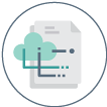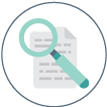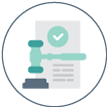Proactive data governance drives data value, improving decision making and supporting innovation. But ensuring data accuracy, consistency, security, and compliance requires a coordinated effort. By clearly defining data governance roles and responsibilities, organizations can more effectively leverage data for business value.
Typical roles and responsibilities include data owners, stewards, custodians, and consumers, guided by a data governance committee. Individual organizations will, of course, adapt these roles according to their needs and organizational maturity.
Data Owner
The data owner refers to the person or group with authority and accountability for a specific dataset. Usually a senior manager or business leader, data owners define business requirements and rules for the data. They also establish quality standards and metrics and approve data policies and procedures.
For example, a marketing director owns customer data, overseeing customer segmentation, targeting, and personalization strategies. Likewise, a product manager owns the product data, driving the product development, launch, and feedback processes.
Data Steward
Data stewards include those responsible for implementing data policies and procedures. For instance, a data steward will help monitor data compliance with established regulations and internal standards. They may also educate the workforce on how to access, use, and share data to ensure compliance with privacy and security best practices.

Data Custodian
Data custodians oversee the technical aspects of data management. This includes the processes surrounding data storage, and well as backup and recovery, data access, and quality control.
For example, database administrators manage the databases that store the data, ensuring optimization and security. Data analysts, on the other hand, perform queries and reports on data using tools such as SQL or Python. Their insights and recommendations support decision making.
Data Consumer
Data consumers, as the name suggests, use data for a variety of purposes, from decision making to innovation. They play a key stakeholder role in data governance, as they have specific needs and expectations regarding the quality and availability of the data.
For example, marketing managers leverage data to personalize marketing campaigns. Or product managers developing new products collect data regarding user behavior to inform decisions about features to include.
Within the data governance framework, data consumers have responsibility for providing feedback and identifying issues. These may include issues such as errors or inconsistencies within the data set. They may also include problems with accessibility or data silos that diminish data value.
Data consumers also play a critical role in data security and compliance. By complying with security best practices and policies for data use, they help reduce risk.

Coordinate Data Governance Roles and Responsibilities to Drive Business Goals
The data governance committee includes stakeholders from across the organization. This committee oversees the implementation and maintenance of the data governance program. They begin by defining the vision and goals relating to the organization’s data, as well as the responsibilities of data owners, stewards, custodians, and consumers.
The committee will develop and approve data policies and procedures, ensuring they align with the company’s business goals and compliance requirements. They monitor and measure the performance of data governance activities. And they identify both risks and opportunities for improvement. Importantly, they serve as data champions.
For example, a healthcare organization’s data governance committee oversees the quality, privacy, and security of patient data across different departments. Likewise, a retail company’s data governance committee coordinates the collection and integration of customer data from various sources.
Jumpstart Data Governance Strategy with Expert Guidance
Effective data governance requires building data strategies one piece at a time. The data experts at eMazzanti Technologies and Messaging Architects will help your organization implement a structured and comprehensive program to reduce risk and increase data value.
eGovernance Cloud Solutions
eGovernance is a Cloud based solution for preserving, discovering and accessing digital data within your email and document storage systems for compliance, audit, security, eDiscovery and warehousing of critical or older data.



